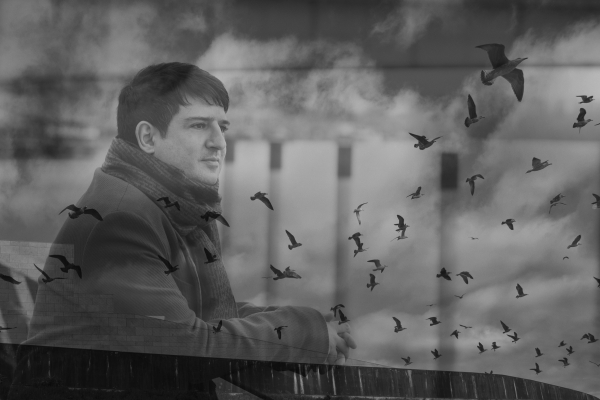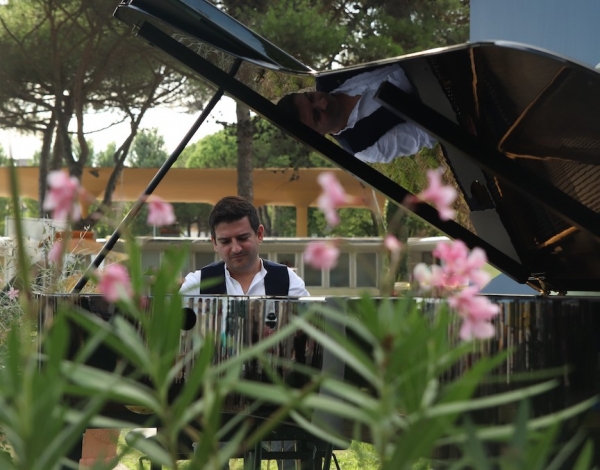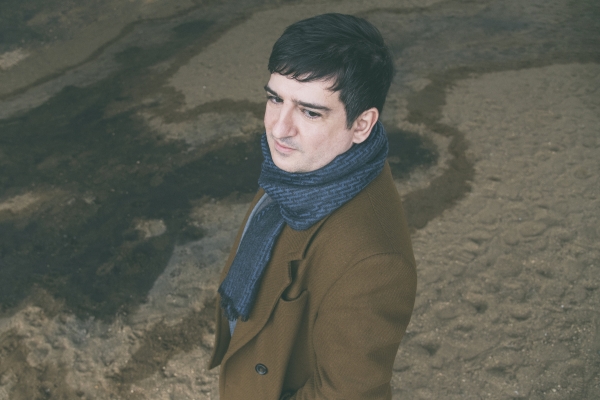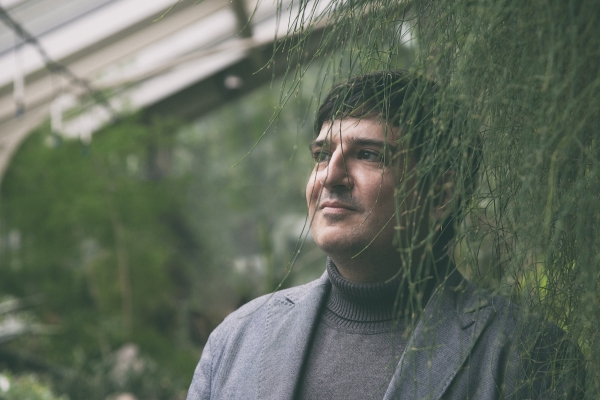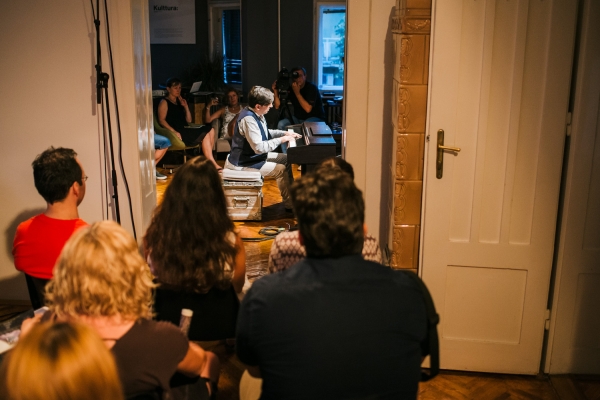One of the things I love most about writing reviews and interviews is discovering artists and music that I probably never would have found otherwise. (Actually, most of the artists find me, which is even more exciting!) One such artist is Serbian pianist/composer Kosta Jevtić, who released his first album of original music,
Reflections on a Journey, earlier this year. One of my favorite albums of 2020, the music is deeply personal and reflects on Kosta’s recent travels as well as his inner world. He has an amazing story to tell, and I’m so glad he was available to do this interview. I’m sure you’ll enjoy getting to know Kosta Jevtić and his wonderful music!
KP: I have to admit that this is the first interview I’ve done with an artist from Serbia! I’m so excited to discover that MainlyPiano.com is being viewed all over the world! Music is truly the universal language! I’m curious, though - how did you find the site?
KJ: MainlyPiano is a wonderful project. Actually, it was the PianoHaven website that eventually brought me to MainlyPiano.com. I was excited when I discovered the concept of their concert series and I wanted to learn more about the artists who performed at their beautiful venue so I Googled a bit and that led me to you. I`m glad it did because I didn`t know such a register of pianists/composers existed. I think it`s a great Idea to have everything systematically presented in one place - the Artist Pages, reviews, interviews, the newsletter. It`s neat and well done and the fact that my personal Artist Page is now there, too, really makes me happy.
KP: That’s a pretty amazing story! I have a house concert series here in Oregon, too, so if you play at Joe’s at PianoHaven, you have to promise to play here, too! We’re only about 1300 miles apart! haha!
KJ: I`d be more than happy, Kathy! It`s always wonderful to meet dedicated promoters of piano music and house concerts which, by the way, are one of my favorite types of music events.
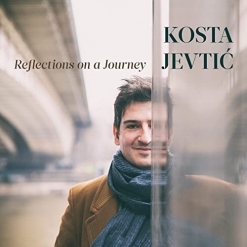
Click on album cover to go
to Kathy's review.
KP: I would love that! You recently released your debut album, Reflections on a Journey, which I absolutely love listening to and reviewing. Tell us a bit about the music and the inspiration for it.
KJ: I could describe Reflections on a Journey both like a music travelogue and my personal musical diary. When making the selection of the ten piano pieces presented on the album, I followed the idea of making a coherent, introspective, meditative work. The music was composed between 2016 and 2018 and most of the pieces are connected to my recent travels to the Mediterranean. The titles refer to some wonderful and inspiring places I visited, but those actual places and those actual impressions were just a starting point that triggered a deeper process of self-reflection through that music. So it`s extremely intimate. At the same time, it invites the listener to uncover and deeply examine their own plethora of emotional layers through listening.
KP: According to Spotify, the most popular piece on the album is the first one, “Chiostro Del Paradiso.” What is it about?
KJ: Several titles on the album are connected to my fascination with the city of Naples and its surroundings. I love Naples. I made some beautiful friendships there, I played several concerts there in the last couple of years, and my first contact with the Piano City concept also happened there. So many wonderful things connect me with Naples that I can say it feels like home. In 2017, I visited several picturesque places at the Amalfi Coast. I was blown away by the beauty of the Moorish-style Cloister of Paradise in the famous Cathedral of Amalfi and that was the first piece I composed after I got back home.
KP: “Sappho’s Dream” also has a video and seems to generate very positive comments. What inspired that one?
KJ: It`s my humble homage to the sublime art of the antique poet, Sappho. The interesting thing is that there are some similarities between the musical meter of the main theme and the metrics of Sappho's poems although I didn't do it intentionally. The piece combines a Couperin-like melody with simple, almost minimalistic, accompaniment figures, all enveloped in modal atmosphere. The culmination is striking but not intrusive. I enjoy playing that piece a lot! I think it`s kind of sweet and elegant.
KP: It really is!
I’ve always been amazed at how well rain can be depicted on the piano - all kinds of rain from gentle drizzles to turbulent downpours. Your piece, “Yr,” is no exception even though it is about a very specific kind of rain. Tell us about that one.
KJ: Nature is an endless source of inspiration. Isn't that wonderful? The title of that piece refers to a type of rain that can be seen in Scandinavia. It`s carried by the cold north wind over frozen pine woods. The water particles are so tiny it looks like a cold steam and when you`re outside, you can't really get too wet because it`s so gentle. I experienced that phenomenon in northern Norway and I found it so beautiful I thought it merited a piano piece. Actually three of my piano pieces are dedicated to Norway, but only ``Yr`` is included on Reflections on a Journey. I saved the other two for the next album.
KP: Another piece on the album, “Sweet Sun of Southern Lands,” has such a cheerful title, but is actually very dark. What’s the story behind that piece?
KJ: It`s a simple piece in terms of form and harmonic structure. The atmosphere is dim and mysterious throughout and transforms only in the very end as if dark shadows are being replaced by a ray of sunlight. The inspiration came during the refugee crisis when thousands of people from the Middle East came to Europe fleeing war in their homeland. The title refers to the Sun that`s been taken away from them. Foreign land embraced them but their sadness doesn't go away because the Sun of their homeland can never be replaced. This feeling of being caught in a loop is represented by the persistent accompaniment figure that keeps repeating throughout the piece. They are mourning and longing. Only in their dreams can they see their lost Sun and only then can they feel complete again. I`m not actually telling their stories. I`m deeply moved by their stories, but I`m telling my own story, my personal experience is deeply embedded into this music.
KP: Let’s explore that. You mentioned in an email that you had experienced being a refugee back in the ‘90s. Tell us a bit about it.
KJ: I was born in a Serbian Christian family in the historic town of Prizren situated in the ex-Yugoslav southern Serbian province of Kosovo. Kosovo was a mild conflict zone a long time before the actual breakup of Yugoslavia happened in the 90`s. It was a multi-ethnic environment and I remember that tensions between ethnic groups always existed. Growing up in such unstable circumstances was challenging. The rise of chauvinism [a form of extreme patriotism and nationalism] during the 90`s viciously culminated in the conflicts that started in 1998 and finished in 1999 with a 78-day NATO bombing campaign. Those events had a tremendous impact on my life. At a certain point, my family faced imminent danger and was forced to leave our home and our hometown. Our house was then burned down and we couldn't go back anymore. All our belongings vanished in the fire - my piano, books, music sheets, all our priceless family heirlooms - some of them more than a hundred years old. Everything disappeared as if it never existed. We settled in Belgrade and had to start over from scratch. It was tough. The sad fact is that this happened to hundreds of thousands of people back then and it`s still happening in too many places in the world.
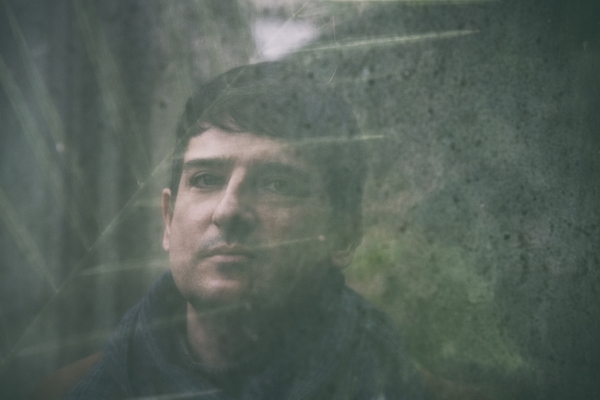
KP: I just can’t imagine going through something like that. My heart goes out to you and your family.
KJ: I appreciate that, Kathy. Conflict-induced migrations are deeply tragic and they affect millions of people in the world today. I think raising awareness of this problem is important. “Sweet Sun of Southern Lands” is my small contribution to that endeavor.
KP: Thank you for that. Going back to the album, was “The Lighthouse” inspired by a specific location or by the idea of lighthouses providing a beacon to keep sailors from crashing into the rocks?
KJ: That piece is my dedication to a remote fishing Island called Ilha do Farol (``The Lighthouse Island`` in Portuguese) that I visited in 2018. It`s a very scenic place in the most southern point of Portugal. There is no traffic on that island and only a few basic shops can be found. There`s a beautiful long beach with golden sand and this very high and elegant lighthouse that dominates the surroundings. I totally fell in love with that place. The sound of the Atlantic ocean waves and the picture of this lighthouse are forever embedded in my mind and now in my music, too. A short time after I returned home, I was going through my photos and experiencing an intense rush of nostalgia when all of a sudden this almost ``Fado-like`` melody appeared in my mind. I was completely overwhelmed by this intense feeling, this nostalgia, and then it was suddenly transformed into music in my mind. It was one of the most moving musical experiences for me.
KP: What an inspiration!
I thought it was interesting that you recorded the album in Spain. Was there a specific reason for that?
KJ: Yes, and what a wonderful reason it was - a friendship! It was a friend`s gift. The album was recorded in Estudio Uno in Madrid. It`s an incredible recording facility, probably one of the best in Europe. They have a wonderful Steinway D and my friend David Izquierdo Rentería, who`s one of the leading Steinway technicians in Spain, is taking care of that instrument. So Estudio Uno was David`s recommendation and the actual recording session was his gift to me.
KP: What a wonderful gift to all of us as well!
You are the Artistic Director of Piano City Novi Sad Festival. Tell us about that.
KJ: Piano City is a licensed concept of a music festival created by German pianist Andreas Kern. His genuine Idea was a three-day event with one hundred house concerts organized throughout the city. All kinds of music, all kinds of pianists, professionals and amateurs, beginners and virtuosos - everyone was welcome. If the hosts opened their windows during performances, the whole city would resonate with piano music. Thus the actual superstars of the Festival were the Piano and the City. Isn't that a wonderful Idea?
KP: YES!!!
KJ: The first such event happened in Berlin in 2010. Soon after, the concept was presented in Italy by Ludovico Einaudi and the first Piano City Milano was launched in 2011, followed by Piano City Napoli in 2013. By that time, concerts in various public spaces throughout the city were added to the existing concept.
When I visited Naples in 2016, quite a few locals mentioned Piano City to me in common everyday conversations. I was curious to learn more about it so I contacted pianist Dario Candela, the artistic director of Piano City Napoli. He shared his experience with me and I immediately envisioned the Festival in Serbia. When I got back home, I told the story to my best friend, pianist Maja Alvanović. We contacted Andreas and the next thing I knew - the two of us were launching the first edition of Piano City Novi Sad in September 2017!
Maja and I did the complete project management together and on our own. Looking back from this point, it seems incredible how we managed to do it. Piano City is an exceptionally complex project and we didn’t have much experience in event management, if any. But we were determined and focused and we succeeded. Hundreds of pianists applied from all Europe. Some new piano duos and duets were formed especially for the occasion, academic composers wrote music especially for the opening event, dozens of partners got involved. There were concert marathons in parks, museums, at the Danube River beach, even at the bus station. Music schools had their group presentations in public places, there were courses and masterclasses, TV cameras were all over. It was surreal, to tell you the truth. It was an enormous blast of creative energy and for that one weekend, Novi Sad became the regional Mecca for pianists.
The 2018 and 2019 editions were just as beautiful as the first one. This year we decided to suspend the Festival because of the COVID-19 pandemic. After the intense experience of the first three editions, this pause is useful for me to see where I am and where I want my career to go. Event management is very exciting, very dynamic, but it doesn’t really go perfectly with a concert career. We’ll see what the future holds.
In any case, Piano City Novi Sad is one of the most beautiful projects I`ve gotten myself involved in. If I ever write a book about how we founded it (and frankly, I think that story could be a great plot for a novel), it will be an exciting book not only about piano and pianists, but, first and foremost, about inspiration, passion, dedication, self-sacrifice and adventure.
KP: That sounds truly amazing! I don’t think there are any events quite like that here in the US. It would be incredible to experience something like that!
KJ: Actually, last year (2019) a promotional Piano City event took place in NYC for the first time. As I`m informed, it was a one day concert marathon in three different locations. Who knows, if the New Yorkers liked it maybe the Festival`s network will continue to grow in the US.
KP: I hope so!
How long have you been a music educator?
KJ: It sounds incredible to me, but it`s been almost three decades now, if we take into consideration my first steps in the field of accompanying. I was only 16 when I got my first assignment as a student-accompanist in the vocal studio in my music school. For the next couple of years, my responsibilities were in-class accompanying and accompanying at recitals and competitions. From that moment on, the accompanying and vocal repertoire got under my skin. It was a crucial experience for me because it determined my professional path for many years ahead. Very soon I started giving piano lessons, too. My first teaching experience was a part-time job in a music school while I was a University student. I remember I was very passionate about it. I think I was only 19 when I sent my first student to a national piano competition after just a couple of months working. Looking back from this point, that was extremely brave and risky, but the fact that that student is now a wonderful concert pianist gives me peace of mind.
KP: You also accompanied other artists on the piano. Did you or do you tour with them as well?
KJ: I do. I enjoy collaborating with other musicians. Earlier this year we launched a tour titled International Bridges of Music with internationally acclaimed opera singer Boris Martinovich and his wife, soprano Diana Martinovich. Unfortunately we only managed to give the first concert in Belgrade before the tour was cancelled due to the lockdown in March. Last year, I performed in Italy with a wonderful bass-baritone, Salvatore Salonio. I hope the situation in the world will normalize soon so all musicians can continue planning their concert activities.
KP: Absolutely! Have you played in the US?
KJ: Not yet and I`d love to! I must admit it`s one of my dreams. I hope I will get a chance once the pandemic is over.
KP: Oh, I hope so!
You mentioned that you started composing in 2016 after a change in your relationship with the piano. What changed?
KJ: I needed a new and different approach to playing. I wanted to be more direct and more personal on stage. I wanted to directly express my own feelings, my own thoughts and my own beliefs through the music I played. I wanted to tell my own story. Composing was the most direct way to achieve that.
KP: What inspires you to compose?
KJ: More than anything else, the piano itself is the main source of inspiration for me. I have a strong need to always explore the instrument and experiment with it. It`s a process that brings a lot of joy and fulfillment to me. When I`m away from the instrument for several days, like during a trip for example, that need intensifies a lot and very often new musical ideas emerge from that feeling.
KP: How old were you when you started playing the piano? How long did you take piano lessons?
KJ: I started taking piano lessons when I was eight. The music education system in Serbia is integrated into the state education system, and for a classical pianist, it normally takes around 15 years to complete formal music education. After completing elementary and secondary music school, I studied Piano Performance at the Academy of Arts, University of Novi Sad. I graduated under Professor Kemal Gekić, an internationally acclaimed virtuoso who is now based in Miami, Florida, and is teaching at the FIU.
KP: Were you encouraged to compose or improvise by your teachers?
KJ: Unfortunately, improvisation and composing skills are not included in the piano performance curriculum in our schools, but I was lucky enough to have wise professors who understood that my talent needed to develop naturally. They were mainly focused on developing my technique while always letting me express my musical Ideas freely. After graduating from the University, I was ready to start discovering just any side of the musical world I was attracted to. I was pretty much attracted to accompanying and teaching, and my career went that way. It wasn`t until my late thirties that I felt this sudden and strong urge to compose, and when it happened I completely dedicated myself to it.
KP: Life has interesting ways of working its magic, doesn’t it?
KJ: That is so true. Quite often unexpected, too.
KP: Is anyone else in your family musical? Do you play other musical instruments as well?
KJ: Music (both playing and singing) was a natural part of everyday life in my family. My father was a keen self-taught multi-instrumentalist, one of my aunts played cello and piano in her youth, and everyone sang beautifully. Family gatherings were unimaginable without group singing. My father had that special and very rare talent - he intuitively knew how to play just any instrument the moment he`d take it in his hands. He was a financial professional, just like my mother was, and music was his hobby, but at the same time, it was a very important part of who he was. His favorite instrument was ocarina and he played it beautifully. He also sang and played classical guitar, Serbian pipe, block flute, piano, you name it. I`m not anything like him when it comes to instruments - I`m not versatile at all and I play only piano. :)
KP: Well, maybe, but you certainly create and play beautiful music on the piano!
Who and/or what have been the biggest influences on your music?
KJ: I guess certain influences of classical masters like Rachmaninoff, Scriabin, Debussy or Satie are obvious and inevitable. However, I think my music is strongly influenced by specific cultural patterns that I absorbed in my childhood growing up in a multicultural environment with a dominant oriental nuance. My birth town is an important historical medieval site with a very colorful mixture of Christian and Islamic culture. It vividly echoes in its architecture, cuisine, traditional music, local customs etc. I grew up listening to church bells ringing and Muslim call to a prayer chanting, every day, many times a day. I was exposed to those sounds for years, as well as to traditional music of that region, so I`m absolutely sure they are now emerging from my earliest memories and appearing in some form in my music.
KP: Who are some of your favorite composers?
KJ: It`s not easy to single out names as there are so many wonderful composers in the history of music. If we are talking about historical periods, I am a huge fan of French and Italian Baroque in general. If we are talking about the opera, my favorite genre is verismo. Then, I admire composers who expressed themselves through their genuine musical style without leaning too much on tradition. Probably the most striking such example in the history of music is Claude Debussy. Very often I think about composers who died at a young age and their talent never got a chance to fully blossom. Such examples are Portuguese composer Antonio Fragoso and English composer William Baines. They both lived tragically short lives and yet they left us some amazing musical works. I like to play Scriabin`s early works. Russian romanticism in general is very close to me, Spanish music, too. As an accompanist I played many enjoyable 20th and 21st century works, from Neoclassicists like Poulenc to contemporary masters like Piet Swerts. I adore accompanying German Lied and all songs in general. Among composers of our time, I will single out Arvo Pärt as my favorite, and if we are talking about experimental composer-pianists today, my #1 favorite, without any doubt, is Nils Frahm.
KP: That’s an impressive list!
KJ: And it`s not complete if none of the American composers is mentioned! I`ve been listening a lot to the recordings of Maria Schneider`s orchestra lately. She`s such an inspiration! Her music is sublime.
KP: What has been your most exciting or moving musical experience or musical moment so far?
KJ: I`m pretty much sure the excitement and joy that I feel while composing a musical piece surpasses all other musical experiences. Those moments are magical.
KP: If you could have any three wishes, what would they be?
KJ: Playing a recital and recording an album at Piano Haven during a USA tour. That`s already three wishes in one! :)
KP: I hope you can make them come true!
Many thanks to Kosta Jevtić for taking the time to do this interview. For more information about Kosta and his music, be sure to visit
his website and his
Artist Page here on MainlyPiano.com.
Kathy Parsons
August 2020

